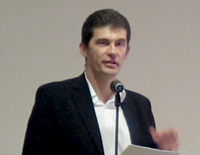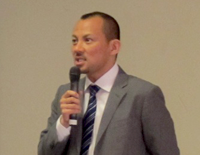Changing the Arab Gulf States: Monarchy, Expatriate, and Economic Outlook in the Gulf
September 17, 2014, (Wednesday)
Japan External Trade Organization (JETRO)
>>>>Event Guide/Program
Organizers: Center for the Multicultural Public Sphere,
Utsunomiya University and IDE-JETRO
Introductory Remarks
Dr. Masaki Matsuo
(Associate Professor of the Faculty of International Studies, Utsunomiya University)
I am currently receiving support from the Ministry of Education, Culture, Sports, Science and Technology (MEXT) to conduct a four-year research project on the political, economic and social effects that immigrants have on the Arab states of the Persian Gulf. I have conducted field research up to this point in Saudi Arabia, Bahrain and Oman. Today, I would like to present a portion of what I have found. I invited Dr. Valeri from the UK and Dr. Gardner from the US, and we will discuss the latest trends in the region as well as the relationship between immigrants and the economies. There will be three sessions. I would like to answer questions from the audience in the final session. I hope to garner valuable feedback from the audience with which I can improve my research.
Session 1: The Current State of the Economies and Monarchies in the Gulf States
“The Gulf States & Business Relations: The Role of Business Actors in Effective Policy”
Dr. Marc Valeri
(Lecturer of the Social Sciences and International Studies,The University of Exeter)
Prior to the Age of Oil, the rulers in the Gulf States allied themselves with regional elites to maintain domestic stability. Among these elites were merchants—the key partners who financially supported the rulers.
When oil was discovered, the rent income (rent-based profits that directly flow to the state, such as export revenue of natural resources that are not linked to the productive capacity of the populace) from oil would become the cornerstone for the political legitimacy of the Gulf States. The rulers and populace would thus form a new ‘social contract’. It would effectively create the opposite circumstance of the famous slogan ‘no taxation without representation’—therefore becoming ‘no representation without taxation.’
In Kuwait, the strong merchant elites have sought involvement in the decision-making process and a political role. Yet, in Qatar and the UAE, the merchant class has been less adamant about seeking involvement in the decision-making process. However, all political regimes kept the merchant class an arm’s-length away from the decision-making process. The political regimes instead worked to deter involvement by the foreign merchant class (and protected domestic markets). In Bahrain, the business elite remain dependent on a balance of power within the ruling family. Even during the labor market reforms of 2000, a power struggle broke out between the traditional merchant class surrounding the prime minister and the newly developing merchant class surrounding the crown prince. Oman differs greatly with other Gulf States in that it is an absolute monarchy under Sultan Qaboos. The business elite hold a strategic position in the economic activities of the country, and support the political legitimacy of the regime.
The recent trends of the Gulf States in response to economic globalization, such as labor market reforms, economic privatization, and the naturalization of laborers, threatens the vested interests that the business elites have gained up to now (including through the protection of the domestic market). In comparison to other countries, the business elites in the Gulf States are strengthening their influence (through marrying into the ruling families and advancing economic growth); yet, where can we find the balance with the political regimes?
The Arab Spring adds a new element to the relations between the state and business. Protests were the largest issues for Kuwait, Bahrain and Oman. The protesters’ demands included more employment and accountability for corruption. The interests of the business elites are linked to the political elites, and this was judged by the protesters to be corruption, and became the primary target of the protests. In Oman, the Minister of Finance and the Minister of Commerce and Industry, who had long served, were dismissed, and it became clear that the new generation would no longer accept political legitimacy based on oil rent. This presents a dilemma for the future of the regime.
In Bahrain, the situation is somewhat different: the business elite have been continuously dependent on the balance of power within the ruling family there. In the UAE, the business elite support the policies of the government and they did not appear to sympathize with the protests. The ruling family controls the economy. Similar to the UAE, the ruling families also assert control in Qatar.

Dr. Marc Valeri (Lecturer of the Social
Sciences and International Studies,
The University of Exeter )
Session 1: The Current State of the Economies and Monarchies in the Gulf States
“Demands for Increasing Transparency and Accountability: National Assemblies in the Gulf States”
Dr. Hirotake Ishiguro
(Research Fellow of the Area Studies Center, Instituite of Developing Economices)
Dr. Valeri asserts that the links between the business elites and the regimes are a stabilizing force for the regimes; however, quite the opposite, I examine other actors who provide a dissenting opinion to the regimes. To take the policy-making process of Kuwait as an example, I will explain the changes in how various actors were involved in that process both before and after the Arab Spring.
The three countries with national assemblies with legislative powers among the Gulf States are Kuwait, Bahrain and Oman. There are consultative assemblies in the UAE, Saudi Arabia and Qatar that review and provide advice on government bills, but possess no legislative power. Reforms, such as the holding of elections, the granting of voting rights and increases in representatives, only began to be undertaken in the Gulf States from the 1990s and onwards. However, it seems certain that these reforms are superficial in nature, and are simply temporary reforms made in response to external pressure. Moreover, they can also be understood in the sense of incorporating the opposition into the regime.
In the Middle East and Persian Gulf region, reforms on the parliamentary system often occur from the top down. Yet, even in appointment systems, there are some representatives who are discovering their role to function as a check against the government, and there are more and more representatives who are actively taking this role.
The number of young people is also exploding, and the governments are gradually becoming unable to support their populations as much as they have up to now. The amount of oil consumed domestically is on the rise, which curtails the source of revenue for the governments, and which means that less and less resources are being distributed to the populations. The governments must carry out structural reforms of their finances and the systems of excessive dependence on the government must change. Future structural reforms may affect not only the populations, but also the ruling families, as austerity reforms cannot be avoided. The governments are pushing forward privatization, but it has also been indicated that this is a hotbed of corruption, with the national assemblies and populations continuously seeking accountability and process transparency.
Next, I will provide an overview of the changes in relations between actors regarding the politics of the national assembly in Kuwait. The first group that was vocal toward the government were the powerful merchant class; however, they sided with the government in the latter half of the 2000s. After the second half of the 1980s, the emerging middle class comprised the cities of Kuwait and civil society, in general. After the late 2000s, the emerging middle class civil society also became active in the city peripheries. The emerging middle class of the city peripheries can even be called a politicized tribe. In the electoral reforms of the 2000s, this politicized tribe came to be the majority among the enfranchised. The powerful merchant class and the emerging middle class (of the cities) are now rebelling.
Relations between the supporting matrix and political power grew more complex with the 2008 elections. That was an effect of the growing influence of those tribes. The tribes who had settled in the city peripheries had politically awakened and made their presence known in Kuwait’s political history.
The conflicts within the national assembly were between the Islamic factions, who sought to Islamize the political system, and the liberal factions; and conflicts over financial dispensation actually grew to become genuine conflicts. Infrastructural development dropped off as one would approach the peripheries. The tribes flowing into the peripheries with the dilapidated public services became the majority by population numbers. The Islamists and the populists are still in conflict with the government.
The opposition bloc has actively questioned where all of the oil riches have gone as the infrastructure in the city peripheries lags behind in development. They are essentially calling for transparency and accountability. They use the Islamic conception of fairness to criticize the government. The populists are for the nationalization of resources. They assert that Kuwait’s riches should be returned to Kuwait, and criticize the persistence of government corruption.
One reason that the conflict between the opposition and the government has not been contained is that the opposition has more representation among the population. The opposition also does not accept responsibility for policy results and frequently calls for the dismissal of ministers. As a result this has paralyzed administrative functions. Kuwait has had six elections in recent years, but this confusion has led the common person to view both the government and the national assembly, which holds the government back, with contempt.
It is the government that forms economic policy, but the cooperation of the national assembly is indispensable. The national assembly checks bids and contract conditions for the oil business and calls for reviews by the State Audit Bureau.
A key point for the development of business is that even with large-scale public works that must be approved by the royal family, the national assembly still calls for accountability. To convince them, it is important that the distribution must be just, fair and consistent.

Dr. Hirotake Ishiguro
(Research Fellow of the Area Studies Center,
Instituite of Developing Economices)

